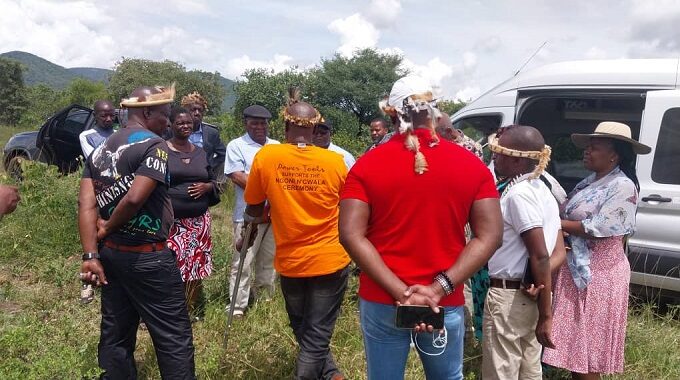
BULAWAYO – A woman who died on Friday after being flagged as a potential coronavirus patient was a Chinese national, the government admitted on Sunday after persistent questions from ZimLive.
Health minister Obadiah Moyo declined to answer our questions around the nationality of the woman and her diagnosis on Saturday, hours before the ministry of information issued a statement describing her as a “Mutare woman”.
On Sunday, government spokesman Nick Mangagwa, after initially stating that he was “not aware” of and “not interested” in the woman’s nationality, finally admitted: “I believe she is Oriental, there’s a big chance she’s Chinese.”
The apparent attempts to cover-up circumstances surrounding the woman’s death, and the fact that she is Chinese, will alarm Zimbabweans who have been critical of the government’s reluctance to impose restrictions on travel between China and Zimbabwe in the wake of the fast spreading epidemic.
Sources had told ZimLive how the woman was wheeled into the West End Clinic in Harare at around 11AM on Friday by her husband “looking very sick.” Some nurses and patients apparently ran away and hid in a room.
A doctor who saw her advised her husband to take her to Wilkins Hospital, the infectious diseases facility in Harare which is at the centre of the government’s plans to contain the virus. She died before she could reach the hospital.
Mangwana said he did not have any further details about the woman, including her age, but reiterated the government position that she tested negative for coronavirus, which has killed over 3,400 people in more than 90 countries since it was first detected in China last December.
The woman arrived from China on January 24, and according to the government, travelled to Mutare, the eastern border town close to Mozambique. She fell ill after complaining of a shortness of breath.
The ministry of information secretary maintained that although the woman arrived dead at Wilkins, the hospital proceeded to carry out an autopsy. Tissue samples were also sent to South Africa, he said.
“There was a parallel test in South Africa. We only confirm when we have both results,” Mangwana added
Mangwana maintained that the ethnicity or nationality of suspected coronavirus patients “is not an issue… it doesn’t matter.”
He told ZimLive: “What I’m more interested in is the fact this person came from China. The next question is, has the 14-day incubation period for coronavirus expired? If it has, I’m more comfortable. If her death had come within this window, there would be a concern.
“We must accept that even if they were Chinese, they can have normal cardiac and pulmonary complications. People don’t stop dying just because there’s coronavirus. There’re still conditions which kill people. Whoever her GP was who referred her to Wilkins was just being precautionary.”
Denying that they were suppressing information around the coronavirus, Mangwana said: “There would be no shame in saying it’s now in Zimbabwe, like other countries have done. The disease is rapidly spreading in the United States, Italy and elsewhere. It’s not a judgement on those countries.
“We’re not hiding anything. If the coronavirus arrives in Zimbabwe, we would not have failed in anything, it’s actually the responsible thing to do to make the disclosure. As long as we are at this information ministry, that’s exactly what we will do.”
The global number of confirmed cases of the novel coronavirus, which causes a disease known as COVID-19, surpassed 100,000 on Saturday in what the World Health Organisation (WHO) described as a “sombre moment.”
Only five African countries – Egypt, South Africa, Tunisia, Algeria and Nigeria – have confirmed positive cases of coronavirus, but none have resulted in death.
About 3.4 percent of confirmed cases of COVID-19 have died, far above seasonal flu’s fatality rate of under 1 percent.
“Allowing uncontrolled spread should not be a choice of any government, as it will harm not only the citizens of that country but affect other countries as well,” the WHO added.
For most patients, COVID-19 begins and ends in their lungs, because like the flu, coronaviruses are respiratory diseases. They spread typically when an infected person coughs or sneezes, spraying droplets that can transmit the virus to anyone in close contact.
Coronaviruses also cause flu-like symptoms: Patients might start out with a fever and cough that progresses to pneumonia or worse.
The WHO advises people to avoid touching their nose, mouth and eyes because hands touch many surfaces and can pick up viruses. It also encourages people to cover their mouth and nose with their bent elbow or tissue when they cough or sneeze. The tissue must be disposed immediately.
Where individuals have a fever, cough or difficulty in breathing, they are advised to seek medical care early.
“Stay home if you feel unwell. If you have a fever, cough and difficulty breathing, seek medical attention and call in advance. Follow the directions of your local health authority,” the WHO says.
Zimbabweans have complained that the government has offered very little guidance on what to do or where to go when one suspects they have coronavirus, and medical staff at hospitals are unprepared to receive coronavirus patients as seen in the panic that spread through West End Clinic on Friday.






